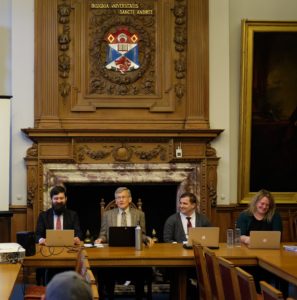St Andrews Encyclopaedia of Theology project: an interview with Brendan Wolfe

The Roundel caught up by e-mail with Brendan Wolfe, Principal Research Fellow at St Mary’s and the Managing Editor the St Andrews Encyclopaedia of Theology project.
The Roundel: Thank you for your time. Can you give us the outlines of this significant project?
Wolfe: It is a pleasure to talk with you. The project is a year-long pump-priming endeavour, funded by the John Templeton Foundation. We are laying the groundwork for a free-to-access, online Encyclopaedia of Theology, with comprehensive articles written by leading theologians from across the world.
The Roundel: Who is working with you on this project?
Wolfe: Steve Holmes and I are the co-investigators, with him taking the role of Chair of the Editorial Advisory Board. At St Mary’s, Oliver Langworthy is working with us as an administrative editor, while Christoph Schwöbel, Alan Torrance, Andrew Torrance, Judith Wolfe, and Tom Wright are all Editorial Advisory Board members. They are joined by John Behr (St Vladimir’s), Sarah Coakley (Cambridge), Matthew Levering (Mundelein), Alister McGrath (Oxford), and Kevin Vanhoozer (Trinity Evangelical Divinity School) in providing editorial advice.
The Roundel: You have set yourselves an enormous task. What inspired it?
Wolfe: Most academic theologians will be familiar with (and perhaps slightly envious of) the Stanford Encyclopedia of Philosophy, which is one of our sister-discipline’s greatest achievements in modern times. The comprehensiveness, influence, and prestige of the SEP represent the highest aspirations of our project. Of course, theology differs from philosophy in our day in certain systematic ways, and so our approach will not be identical to the SEP’s.

The Roundel: Can you tell us more about your approach?
Wolfe: In fine, while planning for compendiousness, we are putting theological topics into new conversations, by creating ‘clusters’ whose authors are encouraged to read and consider each other’s work. For example, our first cluster is on ‘sacrifice’, and its initial articles will focus on a) the sacrificial system outlined in the Pentateuch, b) the concepts of sacrifice in the New Testament, c) the senses in which the Lord’s Supper may be seen as sacrificial, and d) the sacrificial work of Christ. Each of these would have its place in any comprehensive treatment (in Old Testament, New Testament, sacramentology, and soteriology); our innovation has been to bring them together for mutual enrichment.
The Roundel: Will only Christian theology be included?
Wolfe: No. In the full version of the Encyclopaedia, other religions will also be strongly represented. The important thing is that they are included on their own terms, however, and not cut to the schematics of Christian theology. To that end, we plan to establish the Encyclopaedia using Christian academic theology, before adding new, expert editors and expanding to systematic treatment of the other religions. We’ll include some articles on Jewish, Muslim, Hindu, and Buddhist topics in the early stages as well, but it will be a while before that material can be developed according to its own internal logic.
The Roundel: The potential benefits of the approaches you’ve mentioned are considerable, which leads to my next question: for whom is the Encyclopaedia intended?
Wolfe: Our Authors’ Guide says that articles should be written with five audiences and purposes in mind. These are advanced undergraduates, to use as significant sources; teachers of undergraduates, especially in the developing world, to develop curricula; postgraduates and established scholars in theology to use as introductions to a subject, especially suggesting further reading; scholars in adjacent disciplines (history, philosophy, etc) to come up to speed on theological topics; and finally clergy and laypeople to gain an understanding of the state of academic theology.
The Roundel: What more can you tell us about the relevance of the developing world?
Wolfe: Service to the developing world has been one of the most powerful motivations for undertaking this project, both for St Mary’s and for the John Templeton Foundation. There are hundreds of institutions providing theological education across Africa, Asia, the Caribbean, and the rest of the developing world whose libraries are regrettably meagre and where journal subscriptions are unaffordable. The Encyclopaedia will provide the best of modern academic theology at no cost to all those institutions at once. Our website is being engineered with developing-world usage patterns in mind. Furthermore, we plan to partner with exemplary institutions in different regions to work together towards maximally useful material.
The Roundel: What are the remaining steps in getting this project off the ground?
Wolfe: As noted above, we’re currently in the initial phase. This July, we’ll submit a grant application to the John Templeton Foundation which would secure the project for the next five years. Over the summer and early autumn, while we work with JTF at refining our plans and informing their decision, we’ll also keep building our network of planned subject editors, authors, and articles. Assuming we get good news from JTF, in December we’ll begin the main phase of work, and will be off to the races.
The Roundel: When will we see the first fruits of your work?
Wolfe: While our URL, www.saet.ac.uk, currently contains only a holding page, the website is nearly complete. We plan to post the first articles from the sacrifice cluster within the next two months. Of course, those resident in St Andrews can attend our author presentations, of which one, by Prof. Roy Gane of Andrews University, has already taken place. We’re scheduled to hear in the next month from two more authors; the details are circulated in the usual ways.